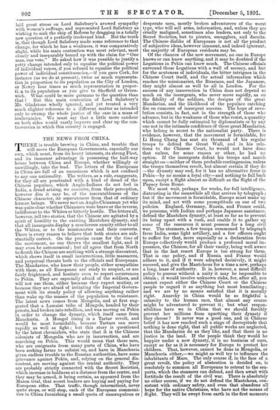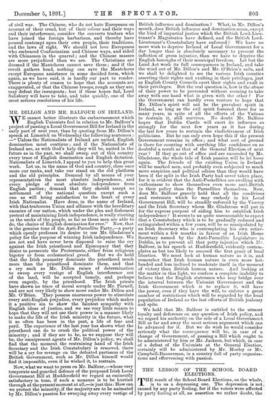THE NEWS FROM CHINA.
THERE is trouble brewing in China, and trouble that will move the European Governments, especially our own, which must, from its heavy interests, its strong Fleet, and its immense advantage in possessing the half-way house between China and Europe, whether willingly or unwillingly, take the lead. The letters of the Europeans in China are full of an uneasiness which is not confined to any one nationality. The writers, as a rule, exaggerate, for they all are penetrated with a kind of dread of the Chinese populace, which Anglo-Indians do not feel in India, a dread arising, we conceive, from their perception, however dim it may be, of the inscrutableness of the Chinese character, its separateness from that of ordinary human beings. We never met an Anglo-Chinaman yet who was quite clear whether Chinamen were brave or the reverse, indifferent to the Whites or bitterly hostile. The letters all, however, tell two stories, that the Chinese are agitated by a spirit of hostility to the existing Mantchou dynasty, and that all insurgents display a murderous enmity either to all the Whites, or to the missionaries and their converts. There is every reason to believe that both stories are sub- stantially correct. On the precise cause for the time of the movement, no one throws the smallest light, and it may even be astronomical ; but all agree that from North to South the Chinese are seething with a strange discontent, which shows itself in small insurrections, little massacres, and perpetual threats both to the officials and Europeans. The Mandarins, who know their people, either sympathise with them, as all Europeans are ready to suspect, or are fairly frightened, and hesitate even to report occurrences to Pekin. They are especially afraid of the soldiers, and will not use them, either because they expect mutiny, or because they are afraid of irritating the Imperial Govern- ment with its steady policy of allowing anything rather than wake up the masses of the population to resistance. The latest news comes from Mongolia, and at first sug- gested that a Lamaist tribe of Mongols, headed. by their priests, had broken into rebellion, and was moving on Pekin in order to change the dynasty, which itself came from Manchuria. A Mongol rising is a Tartar revolt, and would. be most formidable, because Tartars can move rapidly as well as fight ; but this story is questioned by the latest chroniclers, who state that it is the Chinese colonists of Mongolia who are in insurrection, and are marching on Pekin. This would mean that these men, who are emigrants from many parts of China, who have been seeking farms to subsist on, and have in Manchuria given endless trouble to the Russian authorities, have some grievance against Pekin, and, relying on the general dis- content, are moving against the central authority. They are probably strictly connected with the Secret Societies, which increase in boldness at a distance from the centre, and they may be armed, it being certain, as appeared from the Mason trial, that secret leaders are buying and paying for European rifles. That traffic, though intermittent, never quite stops, or will stop, each of the European communi- ties in China furnishing a small quota of unscrupulous or desperate men, mostly broken adventurers of the worst type, who will sell arms, information, and, unless they are cruelly maligned, sometimes also leaders, not only to the Secret Societies, but to pirates, smugglers, and dacoits. The Chinese dislike of Europeans is not all the product of subjective ideas, however innocent, and indeed ignorant, the majority of European residents may be. Of the chances of the new movement, no one in Europe knows or can know anything, and it may be doubted if the Legations in Pekin can know much. The Chinese officials surround those Legations with a wall of secrecy, and but for the acuteness of individuals, the bitter intrigues in the Chinese Court itself, and the actual information which reaches the missionaries, the Russians, and the Japanese, they might almost as well be all in London. For the success of any insurrection in China does not depend so much on the insurgents, who never move rapidly, as on the fidelity of the soldiers, the designs of the great Mandarins, and the likelihood. of the populace catching fire on rumours of insurgent success. The hope of revo- lution consists, in fact, not in the strength of those who advance, but in the weakness of those who resist, a quantity which cannot be fully estimated by diplomatists or by any one not in the intimate confidence of these great Mandarins, who belong in secret to the nationalist party. There is evidence, however, that the movement is formidable, for Li Hung Chang has sent six thousand. of his regular troops to defend the Great Wall, and in his rela- tions to the Chinese Court, he would not have done that unless, for some reason or other, he had no option. If the insurgents defeat his troops and march straight on—neither of them probable contingencies, unless the troops themselves revolt, but almost certain if they do —the dynasty may end, for it has no alternative force in Pekin—by no means a loyal city—and nothing to fall back upon, except a flight almost as difficult as the flight of the Papacy from Rome.
We must wait, perhaps for weeks, for full intelligence, distrusting in the meanwhile all that arrives by telegraph ; but if the movement is formidable, Europe must make up its mind, and act with some promptitude on one of two policies. England, Germany, Russia, and France could, we presume, with Indian and perhaps Japanese assistance, defend. the Mantchou dynasty, at least so far as to prevent its being upset with a rush, and enable it to gather up some of the resources it must possess for a long civil war. The steamers, a few troops summoned by telegraph from India, some light artillery, and a few officers ought to suffice for that, more especially as a declaration from Europe collectively would produce a profound moral im- pression, the Chinese, for all their vanity, being well aware that in the last resort Europe is too strong for them. That is one policy, and if Russia and France would. adhere to it, and if it were adopted decisively, it might succeed, and give the Mantchous for a time a new, perhaps a long, lease of authority. It is, however, a most difficult policy to pursue without a unity it may be impossible to obtain ; it would. involve unknown risks, for, after all, you cannot expect either the Chinese Court or the Chinese people to regard. it as anything but most humiliatino. ; and we are by no means satisfied that it is morally right. Anarchy in China would be so frightful a calamity to the human race, that almost any course might be adventured to prevent it; but what respon- sibilities have we in China that we should forcibly. prevent her millions from upsetting their dynasty if they choose ? It never was a good one, and in Chinese belief it has now reached such a, stage of decrepitude that nothing is done right, that all public works are neglected, that the Mandarins do as they like, and that there is no justice in the land. If the people think they would be happier under a new dynasty, it is no business of ours, except so far as it is necessary for Europe to protect her children. That, however, cannot be done in Mongolia, or Manchuria either,—we might as well try to influence the inhabitants of Mars. The only course if, in the face of a great revolt, the policy of abstention is decided on, is resolutely to summon all Europeans to retreat to the sea- ports, which the steamers can defend, and then await with fortitude the result of the civil war. There is absolutely no other course, if we do not defend the Mantchous, con- sistent with ordinary safety, and even that abandons all hope for the native Christians, who have not the means of flight. They will be swept from earth in the first moments of civil war. The Chinese, who do not hate Europeans on account of their creed, but of their colour and their ways and their interference, consider the converts traitors who have joined the foreign barbarians, and thereby have poured contempt upon their own people, their traditions, and the laws of right. We should not love Europeans who embraced Confucianism and Chinese ways, and sided with Chinamen in the quarrel ; and the Chinese masses are more prejudiced than we are. The Christians are doomed if the. Mantchous cannot save them ; and if the revolt gathers head, nothing can save the Mantchous except European assistance in some decided form, which again, as we have said, it is hardly our part to render. There is plenty of reason to hope that the accounts are exaggerated, or that the Chinese troops, rough as they are, may defeat the insurgents; but if these hopes fail, Lord Salisbury will have to take, and take quickly, one of the most serious resolutions of his life.



















































 Previous page
Previous page